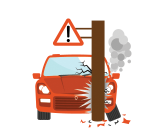
Each state sets their own absolute minimums and then each insurance company has their own options. If you're leasing a car, you're typically required to have a $100,000 minimum per person for bodily injury and $300,000 minimum per accident, with $50,000 minimum toward property damage. In contrast, liability only in Ohio is $12,500 for bodily injury, $25,000 per accident and $7,500 for property damage. If the minimum requirements in your state are low, then your insurance will be low if you get liability only.
However, it's recommended that you get something more middle of the road if you can because $12,500 won't go very far if you injure someone who needs to be in the hospital for days.



Not sure if you should claim it? Get up to 5 free quotes from Glass.net now!
Tough question. If you own a $500 car that's basically being held together with duct tape, you could theoretically make the case to get liability only. It makes no sense to pay half of what the car is worth every year to protect it. Even if you total the car, you can likely pick up another beater (and some duct tape) for cheap. However, if you demolish a $30,000 car for a reason that isn't covered, you could be paying the full amount for what will feel like the rest of your life. There's also the idea that you would be buried under debt in a serious accident — possibly for the rest of your life.
The seductive temptress of car insurance. If you're at fault for an accident, it covers the other driver's car/physical injuries. So cheap, but so dangerous if something happens to your car and you need it to, say, get to work or something. Plus, you have limits on liability coverage for things like bodily injury, meaning you would have to pay the difference. You can only get this coverage if you own the car outright (e.g., you don't have payments or a lease.) While you may be willing to take a chance on your own car, the bank or lease company isn't interested in doing the same. If the financial institution you work with has a stake in the game, they'll generally require you to have comprehensive coverage.
You'll have a deductible you'll need to pay first, but this will cover the damages to your car and pay to get you a new one if it's totaled.
If your car is stolen, you drive into a wall or your car is swept off in a tornado, you'll be covered. However, it won't cover absolutely every scenario so check your fine print first.
When someone hits you, they're required to pay for your car. But if they have no money and no insurance, there's little that can be done. You can sue, but it will likely just cost you more. If you ever find yourself in this situation, uninsured coverage will be your best friend. This coverage is an additional expense, but could wind up saving you more in the end—especially if you live in a poor area where people are unlikely to be able to afford coverage. The good news is that this coverage is cheap.
If someone damages your car at $15,000 worth of damage but their insurance will only pay for $10,000, the at-fault party has to give you $5,000 dollars from their own pocket to fix your car. Just like with the uninsured driver, though, if they don't have $5,000, then you're kind of out of luck unless you have this coverage—if you have this coverage, your insurer will fork out the missing dough.
Even the best insurance coverage will have some type of limit for bodily injury, and medical bills can run into the hundreds of thousands pretty quickly. This coverage means that even if you were at fault, you won't pay anything out of pocket. However, this will not cover additional problems like lost wages or child care the way Personal Injury Protection will.
Coverage above and beyond what your standard car or health insurance policy will pay, whether you were at fault or not. Depending on the type of coverage you purchase, this may also reimburse related expenses for your time (e.g., lost wages if you're in the hospital.)
Unless you live in New Hampshire, you need to have liability insurance, which includes the minimum levels for both bodily injury and property damage.
If you live in Virginia and have a clean driving record, you may be able to pay a state fee every year and skip out of insurance as well. Even if you do have the option to skip insurance, though, you really shouldn't. You're still required to pay for damages, and your license could be on the line if you can't cough up the money.
States like Maine and Alaska sort of go the other way for limits, and set minimums at up to $50,000 in bodily injury per person and up to $100,000 for bodily injury per accident, while Florida has a minimum $10,000 for bodily injury.
With this type of discrepancy, you can imagine that your car insurance premium will widely vary. One in five states requires Personal Injury Protection and one in two states requires uninsured motorist coverage, and your insurance carrier can tell you more about the exact specifics. We're not sure exactly what states were doing when they came up with their specific rules, but our guess is there was a lot of dart throwing on those days.
Sometimes referred to as umbrella insurance, this is additional insurance you can purchase which will basically cover additional costs should you go over your limit. You may also want to speak to your insurance carrier if you have specific scenarios that you would like covered. Insurance can be personalized to you, it just won't come for free.
The deductible is what you have to pay out of pocket, before your insurance kicks in.
So, if you cause $1,500 worth of damage to another car and you have a $1,000 deductible, then you pay $1,000 and your car insurance pays $500. Your deductible is per claim (not per year), so if you have another accident 6 months later, your deductible will be the same. Essentially, the higher your deductible, the lower your insurance policy. However, choosing the higher deductible can be financially crushing if you do have an accident.
It really only makes sense to get a high deductible if you are ready to replace your car if something happens to it, or you don't technically need it for anything essential like work or school.
If you have an 'In Case of Accident Emergency Fund' in your cookie jar, then we guess that's also fine. In life, you either pay now or pay later. High deductibles mean lower payments, so you can stay legal even when you're getting paid in smiles. A gambling man (or woman) could rely on the fact that they won't cause an accident, but no matter how safe you are, you're still taking a big chance. If you know you can't afford a $2,000 hit if you have a major accident, then you should probably stick to a lower deductible.
Practically everything affects your premium, and insurance companies will use words like algorithm and mitigation, and spin their reasoning in such a way that inevitably makes you angry or bored. That said, it more or less goes like this:
Bad Stuff
Good Stuff
Quite simply, it all comes down to risk analysis. If the insurance company believes you’re a high risk (i.e. more likely to cause an accident), your costs will be higher than if you’re perceived as a low risk. If you drive an expensive car, then your premium will be higher than if you drive a cheaper car, simply because your insurer has a higher risk if your car is in an accident
It's worth thinking like a car insurance company if you want to know what affects your premium. For example, think about yourself and your friends at 16 years old, and you'll find out why it costs more to insure younger drivers. If you show yourself to be responsible (e.g., no speeding tickets, accidents or DUIs, etc.), then you'll likely see a lower rate. It also depends on how expensive your car is, how often you drive it, and the neighborhoods you'll be going to. The more you drive your car, the more likely you'll be in some sort of collision. If you drive your car solely for business, you'll be charged a different rate than if you drive it as a regular vehicle. Believe it or not, the color of the car may even affect the cost of your premium, as police are like bees and attracted to brighter colors.
You'll be asked a lot of questions when you sign up for auto insurance for the company to determine your rates, so expect the Spanish Inquisition of car insurance. You'll need to give them information about where you'll be driving, the exact type of car you have along with its age and mileage, and how often you plan to drive it. At this point, it's tempting to lie about your driving habits to get a lower rate, but you risk a denial of your claim due to fraud if you do have some sort of accident.
As hard as it can be to swallow this, insurance companies aren't necessarily out to crush your wallet with their greedy, giant hands. They are there to figure out their risk, so they aren't swallowed up by bills they can't pay. The best way to get your rates down is to keep driving safely, but it may take you a while to prove yourself.
Young drivers simply don't have enough experience to insure at the same rate as someone who's been driving for 10 years. However, there are good student discounts meant to showcase your overall responsible nature if you don't exactly have the power of numbers on your side. If you're a new driver but not young, you may be able to point to something like your credit score to demonstrate your responsibility.
If Danica Patrick and Dale Earnhardt Jr. grace your walls and your car goes up to 180 MPH and maybe (just maybe) you have a couple of fender-benders under your belt, you may already know that you're considered a high-risk driver. You will be paying more for your insurance (at least at first), and you may want to find other ways to handle your need for speed.
You don't have to stay in your state to get your insurance benefits and you can even head to the Great White North (AKA Canada) if you want! However, if you head to Mexico then you will have to buy liability insurance there before you're legal.
Each company differs, but generally when you mess up enough times, you're going to either lose your insurance or your carrier will not renew your policy. Tickets, drunk driving and accidents can all threaten your standing, as can lying to the insurance company. So all those questions they ask you when they're trying to determine your rates? Yeah, don't lie about the answers.
For those who are in the highest risk categories, there are pools or markets that you can enter into that are sanctioned by the government. These are meant for people who've been denied for insurance repeatedly, and it distributes the risk as best as possible. While these policies can be more expensive, they're often the only way that extremely high-risk drivers can drive legally
Insurance companies are really into lessening the chances they take, meaning that tiers are a somewhat fancier and more detailed way to calculate how likely you are to get into an accident. Much like a customer satisfaction card, there in an 'Excellent' tier for those with pristine driving records, practical vehicles and lots of experience and a 'Poor' tier for those who have several accidents. There's also an 'Acceptable' tier for those who fall in the middle.
If you buy a car for $10,000 and drive it around for a year, the wear and tear during that year may drop the value of the car down to $8,000 (at least according to Kelley and a certain Blue Book.) However, what if you still owe $9,000 on the car? Gap insurance is meant to cover the difference should you total your car, and it typically doesn't come under comprehensive insurance. It's often purchased separately, through another carrier, but can be purchased or added on through your primary insurer. If you pay through your primary insurer, you only have to file one claim, but it can be more expensive to go that route. Each company has their own gap coverage policies, so they may pay the straight difference or a specific percentage (e.g., 125% of the balance owed.)
Fraud is common, and it raises everyone's rates. Unfortunately, it can be tough to prove. Mechanics overcharge on their repairs and people make strategic moves on the road to score off their insurance. They may lie about the extent of their injuries and pain. While it's not always caught by insurance companies, it's worth disputing as much as possible if you think someone is committing fraud against you.